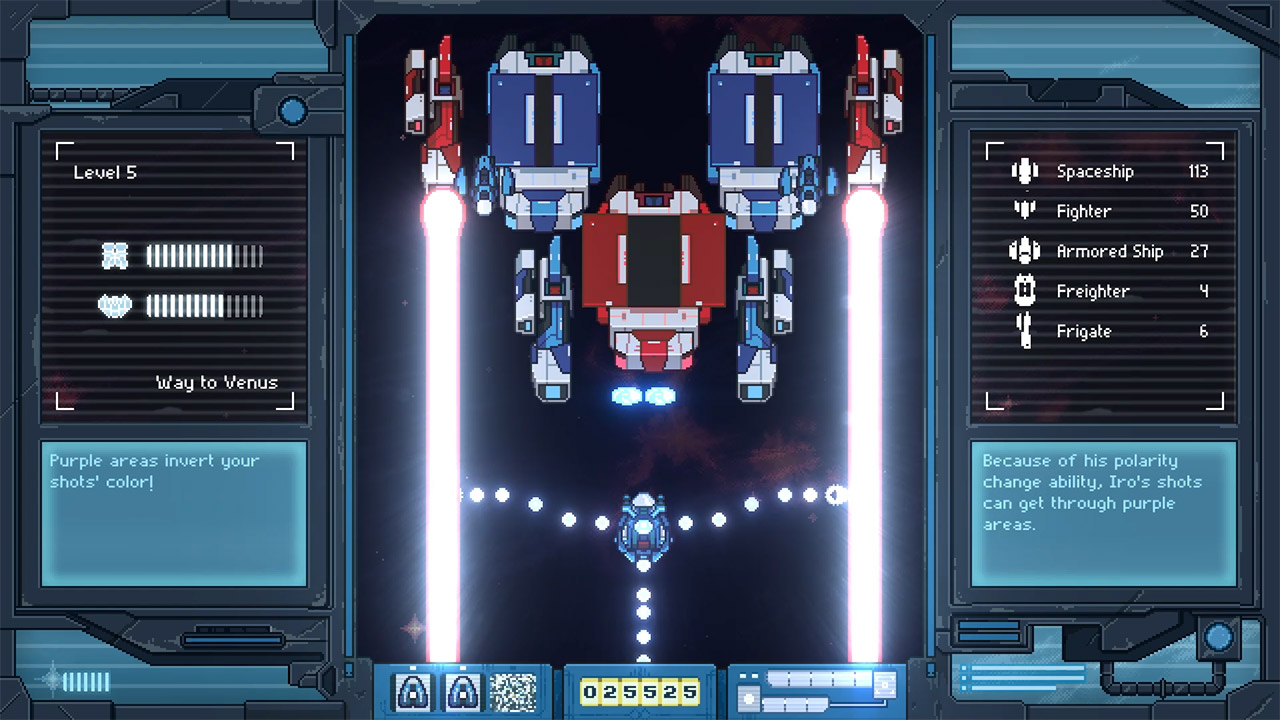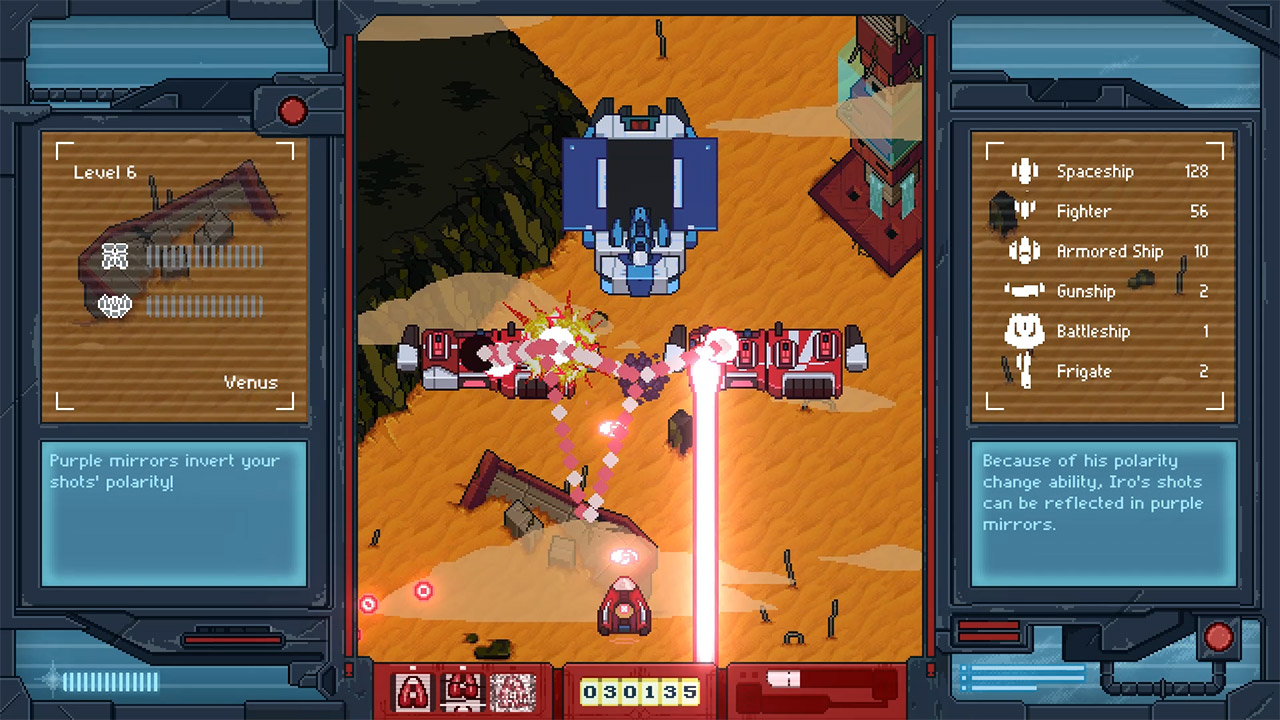
Iro Hero can’t quite make up its mind about what is trying to be accomplished. There seems to be this constant give and take, within the game, about what kind of shmup it’s truly looking to be. On the one hand, there’s this constant drive to try to ramp up the difficulty: after all, all the best vertical shooters are difficult and taxing, and that makes for a hardcore satisfaction. On the other hand, the average player is going to have a tough time dealing with relentless challenges, so we pull back a bit, sometimes too much. The end result is a bit of a muck at times: instead of bullets with occasional music, you have a cacophony that suddenly drops to silence.
Iro Hero’s story is one that might feel a bit too familiar for anyone who went to the movies in the late 90s. An alien race has come to visit Earth and bestowed upon them the ability to turn their own inner energies into electricity, creating an amazing new source of power. Rather than just have everyone chill, certain powers then decide to enslave a bunch of humans to become living generators, and even sell a bunch of humans to other aliens as horrifying batteries. Our young hero, Iro, has lost his mother to one of these farms, and is determined to strike back and get revenge, not only for his family, but all of humanity. Sadly, some humans are pretty okay with slavery as long as they’re not the ones hooked up to jumper cables, so they provide a bit of an impasse to Iro’s quest for justice. I’m actually not totally sure how we get from the story setting to “flying around in ships,” but that’s cleared up a bit as we go. Only a bit, however, so please don’t expect the most amazing plot twists to accompany your journey.

As mentioned, Iro Hero is a vertical shooter with a small twist: Iro’s ship has the ability to change color polarity, shifting from blue to red and back. When you shift, you become invulnerable to the shots of the enemies of the same color, absorbing blue bullets when blue and red when red. You can also ONLY do damage when you’re the opposite color: no hiding behind a blue shield and expecting to do any sort of damage. Instead, you need to shift back to the opposing hue in order to take down enemy ships, which traditionally have a very short amount of life. Absorbing the enemy fire also has the advantage to fill up a special attack meter, which unleashes a homing attack of sorts that can quickly clear out patches of enemies. Be careful, though: if you don’t change color before using this shot, you’re more-than-likely going to waste it, as even the alternative weapon won’t do a damn thing against same colored foes.
There are a few good points to Iro Hero. For one, the throwback design of the game combined with more advanced techniques does make for an interesting play and execution. Players will be quick to discover there is no collision damage with walls or immobile obstacles, so the idea of actually hiding behind a structure and darting out to shoot is totally plausible and doable. This changes up strategy from most traditional shmups, which is, at least, a chance to re-learn how to do some things. Additionally, the fact that you can’t just shoot through the same color means that you need to get balanced on your trigger and switching fingers: being able to swap, shoot, and swap back requires similar dexterity that players may use in Ikaruga, which also came to the Switch not so long ago. In fact, some might argue that you’d want to try Iro Hero first to drink in the idea and see how it plays before giving Ikaruga a try, simply because the latter is a more advanced style of gameplay, and the former gives you the outline while still taking it (comparatively) easy on you.
But here’s the problem: most people who enjoy shmups have already played Ikaruga in some capacity, and it’ll probably be the first thing you think of when you start playing Iro Hero and realize what the special mechanic of it all is. But while Treasure’s timeless shooter is tight and fast, Iro Hero is distinctly slower in both bullet speed, ship speed and general game pacing. There’s a lot of time put into the gradual reveal of the levels, which, to be fair, sometimes work in puzzle elements to make things more interesting (I did enjoy ricochet shots). The incoming fire is neither heavy or fast enough to cause a lot of stress, and swapping colors, getting off a single shot (which is usually enough to dispatch smaller ships) and then returning to a safe color is almost done sleepily. When you get the powerups that increase your shots (sometimes turning you into a veritable sprinkler of bullets), the biggest difficulty becomes not getting distracted and accidentally running into an enemy, which can kill you regardless of color.

However, that might be the key to Iro Hero’s success. While a lot of people are incredibly intimidated by the difficulty levels and massive legends surrounding classic shooters that have already hit the Switch, Iro Hero promises to be a new game that wants to lure in the curious and the courageous. There’s nothing inherently wrong with the game, only that, if you’ve played a lot of shooters, you won’t get the same thrill out of it. Everyone needs somewhere to start, so why couldn’t it be in a decent game that takes a lot of leads from existing titles? Aesthetically, the music and graphics of Iro Hero aren’t spectacular, but they also aren’t terrible: it flies right down the middle of the lane, much like the game itself.
Iro Hero’s biggest fault is when it’s come out. Had this been released a year ago when the eShop was still just getting it’s footing, it could have been a fantastic addition to any Switch owner’s collection, showing off the potential of portable gaming. Something like Iro Hero couldn’t really work on a tablet or smartphone, but a console that can get up and go with you is exceptionally ideal. Yet here we are, smack dab in the middle of a ton of releases, with plenty under our belt and many more to come, and poor Iro just doesn’t have enough gumption to stand alone and be heard. There’s a chance this game may be forgotten under the tide of free-to-play releases and heavy hitters, but know that, should you give it a chance, Iro Hero is a decent little shooter.
REVIEW CODE: A complimentary Nintendo Switch code was provided to Bonus Stage for this review. Please send all review code enquiries to press@4gn.co.uk.
Subscribe to our mailing list
Get the latest game reviews, news, features, and more straight to your inbox
Thank you for subscribing to Bonus Stage.
Something went wrong.
Iro Hero Review
-
Gameplay - 5/10
5/10
-
Graphics - 5/10
5/10
-
Sound - 5/10
5/10
-
Replay Value - 5/10
5/10
User Review
( votes)Overall
Summary
Iro Hero wants so desperately to stand shoulder-to-shoulder with the shooters that we all know and love, but this little game needs a bit of a boost to really be seen.





